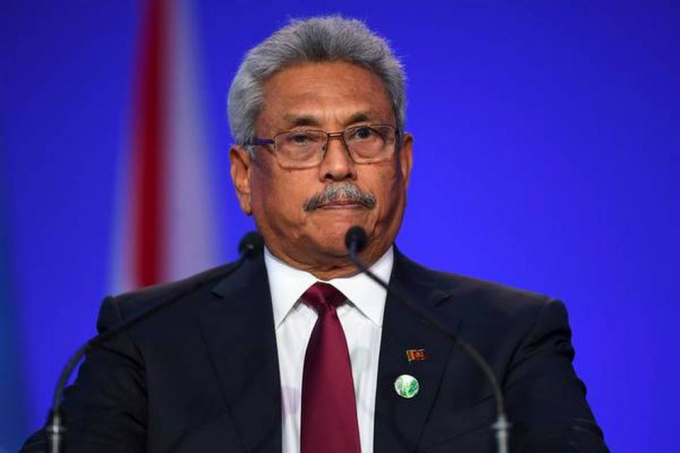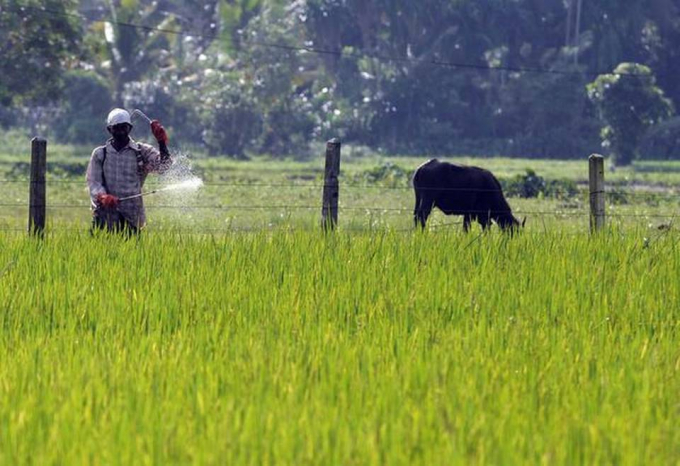May 22, 2025 | 13:46 GMT +7
May 22, 2025 | 13:46 GMT +7
Hotline: 0913.378.918
May 22, 2025 | 13:46 GMT +7
Hotline: 0913.378.918

President Gotabaya Rajapaksa at COP26. Photo: The Hindu
News agency AFP on Sunday reported media remarks made by Udith Jayasinghe, Secretary to the Agriculture Ministry that the government would immediately allow import of chemical fertilizer, effectively reversing its controversial decision in May 2021 banning it.
“We will now allow chemical inputs that are urgently needed... considering the need to ensure food security, we have taken this decision,” the secretary was quoted as saying.
It was not just the bureaucrat who indicated a policy reversal, but also State Minister of Agriculture Shasheendra Rajapaksa, a nephew of the President, who told media that the restrictions on the use of chemical fertilizer would be lifted, except for paddy cultivation. Sri Lanka’s main Opposition party even hailed it as a victory for the farmers’ protests in the country.
However, following a “special discussion” Monday morning with subject ministers and district officials, President Rajapaksa “stressed that the country’s agriculture policy is only for a green agriculture that focuses on the sole use of organic fertilizers”, a statement from the Presidential Media Division said. Subsidies would be provided only for organic farming, he said.
Commenting on the farmer protests across the country, President Rajapaksa said: “the reason behind farmers organising protests and delaying cultivation was that they have not been properly educated.” Officials should work to find answers for the agitating farmers, in accordance with the government’s green agriculture policy, the President said, adding that officials who do not agree with government policy were free to leave, according to the statement released by his office.
The Rajapaksa government’s decision to ban chemical fertilizers, instead opting for an “organic only” policy, has drawn severe criticism from farmers across the nation, as well as scientists and agriculture experts.
Farmers from Sri Lanka’s agriculture-intensive regions have been agitating for months now, demanding that the government revoke the ban on agrochemicals. Tea and paddy farmers are especially concerned, anticipating a 50 % drop in production in the coming harvest season, due to the rash policy shift.

Damage control: The ban on agrochemicals including herbicides and pesticides were withdrawn. Photo: The Hindu
Senior bureaucrat Mr. Jayasinghe, formerly an academic, has earlier said that the President’s decision was “based on wrong advice” given to him. The transition from chemical to organic fertilizer ought to be achieved over a decade, he told the local Daily Mirror in an interview last month.
Govt. ends restrictions on all agrochemicals, including herbicides and pesticides
Sri Lanka abandoned its quest to become the world’s first completely organic farming nation on Sunday, announcing it would immediately lift an import ban on pesticides and other agricultural inputs.
The island country has been in the grips of a severe economic crisis, with a lack of foreign exchange triggering shortages of food, crude oil and other essential goods.
Authorities had already walked back restrictions on fertilizer imports last month for tea, the country’s main export earner.
But ahead of planned farmer protests in the capital, Sri Lanka’s Agricultural Ministry said it would end a broader ban on all agrochemicals, including herbicides and pesticides. “We will now allow chemical inputs that are urgently needed,” Ministry secretary Udith Jayasinghe told the private News First TV network.
“Considering the need to ensure food security, we have taken this decision,” he added.
Vast tracts of farmland were abandoned after the import ban, first introduced in May. Shortages have worsened in the past week, with prices for rice, vegetables and other market staples having doubled across Sri Lanka.
Supermarkets have also rationed rice sales, allowing only five kilograms per customer. sFarmers’ organisations had planned to march on the national parliament in Colombo on Friday to demand the import of essential chemicals to protect their crops.
President Gotabaya Rajapaksa had justified the import ban by saying he wanted to make Sri Lankan farming 100% organic.
The policy was introduced after a massive hit to the cash-strapped island’s economy in the wake of COVID-19, with tourism earnings and foreign worker remittances drastically falling.
Authorities attempted to save foreign exchange by last year banning a host of imported goods, including some food and spices.
Sri Lanka also shut its only oil refinery last month after running out of dollars to import crude.
(The Hindu)

(VAN) Attempts to bring down the price of the Japanese staple have had little effect amid a cost-of-living crisis.

(VAN) Fourth most important food crop in peril as Latin America and Caribbean suffer from slow-onset climate disaster.

(VAN) Shifting market dynamics and the noise around new legislation has propelled Trouw Nutrition’s research around early life nutrition in poultry. Today, it continues to be a key area of research.

(VAN) India is concerned about its food security and the livelihoods of its farmers if more US food imports are allowed.

(VAN) FAO's Director-General emphasises the need to work together to transform agrifood systems.

(VAN) Europe is facing its worst outbreak of foot-and-mouth since the start of the century.

(VAN) The central authorities, in early April, released a 10-year plan for rural vitalization.